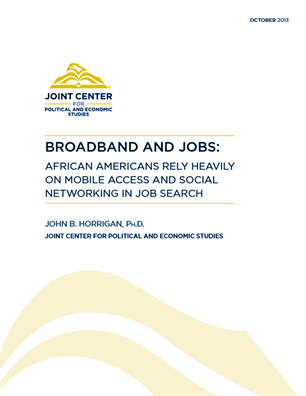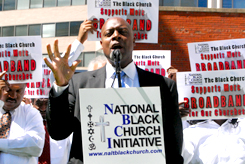Digital Divide Initiative

National Black Church Initiative States Position on Net Neutrality and Broadband
Stopping the growth of the Digital DivideWashington, DC - The National Black Church Initiative (NBCI), a coalition of 34,000 churches across the United States, believes in the general notion of Net Neutrality. NBCI supports the idea that no one should be able to intentionally restrict the quality, content and access of information over the web based upon usage, race, income or any human division that would not make one user’s access equal to another user. NBCI believes that broadband should be universally accessible despite geographic location or income and is vigorously pushing for both Net Neutrality and universal broadband access to become realities in America.
The Digital Divide exists because there are some segments of the population who have the economic means to acquire the technology that is necessary for high speed internet access, and there are other segments of the population who live in an area where that economic prowess is not readily available. This question breaks down to
race simply because the income to purchase new technologies is not readily available to minorities based upon the perpetual unemployment that engulfs the African American community. Therefore, NBCI believes that the government has a moral and constitutional obligation to make sure that high speed internet is available to these communities, there is proper web education and that these individuals are connected to the commerce of the internet. This subsequently helps everyone. If a poor African American child in a particular geographic area learns the essentials of the internet they are far more likely to become a productive member of society than those who have no access at all.
Continue to rest of article
FCC proposes nationwide free super Wi-Fi networks
WASHINGTON -- The federal government wants to create super Wi-Fi networks across the nation, so powerful and broad in reach that consumers could use them to make calls or surf the Internet without paying a cellphone bill every month.
The proposal from the Federal Communications Commission has rattled the $178 billion wireless industry, which has launched a fierce lobbying effort to persuade policy makers to reconsider the idea, analysts say.
That has been countered by an equally intense campaign from Google, Microsoft and other tech giants who say free-for-all Wi-Fi service would spark an explosion of innovations and devices that would benefit most Americans, especially the poor.
Continue to rest of article
The Federal Communications Commission’s Strategic Plan for Fiscal Years 2009 - 2014
This document Was prepared in accordance with the Government Performance and Results Act of 1993 and outlines the Commission’s mission and strategic goals for the next five years.In accordance With the requirements of OMB Circular A~11, the Strategic Plan contains:
- An overarching mission statement;
- General goals and objectives defining how the Commission will fulfill major segments of its mission;
- A description of the means and strategies that will be used to achieve the general goals and objectives;
- A description ofthe relationship between performance goals in the annual performance budget and the strategic goal framework;
- Identiñcaticn of key factors that could affect achievement of the general goals and objectives; and
- A description of program evaluations used in preparing the Strategic Plan and a discussion of future evaluation activities.
Articles on Net Neutrality
The Next Big Battle in Internet PolicyMarvin Ammori
Slate Magazine, October 2012
New York Times Articles on Net Neutrality
The New York Times
December 2010
Net Neutrality is Foremost Free Speech Issue of Our Time
Al Franken
CNN Opinion
August 2010
What’s at Stake in the Net Neutrality Fight
Bill Frezza
Real Clear Markets
November 2011
Net Neutrality: A Tangled Web
The Economist
December 2010
Finding Common Ground on an Open Internet
Eric Schmidt (CEO of Google) & Lowell AcAdam (CEO Verizon Wireless)
Google Public Policy Blog
October 2009
Broadband and Jobs
African Americans Rely Heavily on Mobile Access and Social Marketing in Job Search.A study provided by the Joint Center for Political and Economic Studies illuminating the ways that broadband and mobile technologies help with finding employment.
Click to read more...

Rev. Evans Demonstrates at FCC Headquarters in Favor of Expanded Broadband Availability

Technology and the Religious Congregation
From the The Kojo Nnamdi Show, produced by member-supported
WAMU 88.5 in Washington, DC. Tuesday, Mar. 23, 2010.
From video sermons to text-message tithing, technology is transforming the way religious congregations worship and communicate. On this edition of Tech Tuesday, Kojo looks at how faith communities are adapting to the digital age.
Guests:
Anthony Evans,
President of the National Black Church Initiative; Associate Pastor, Mt. Zion Baptist Church, Washington, DC
Martin Davis,
Director, Congregational Resource Guide, The Alban Institute
Dudley Rose,
Associate Dean for Ministry Studies, Harvard Divinity School

